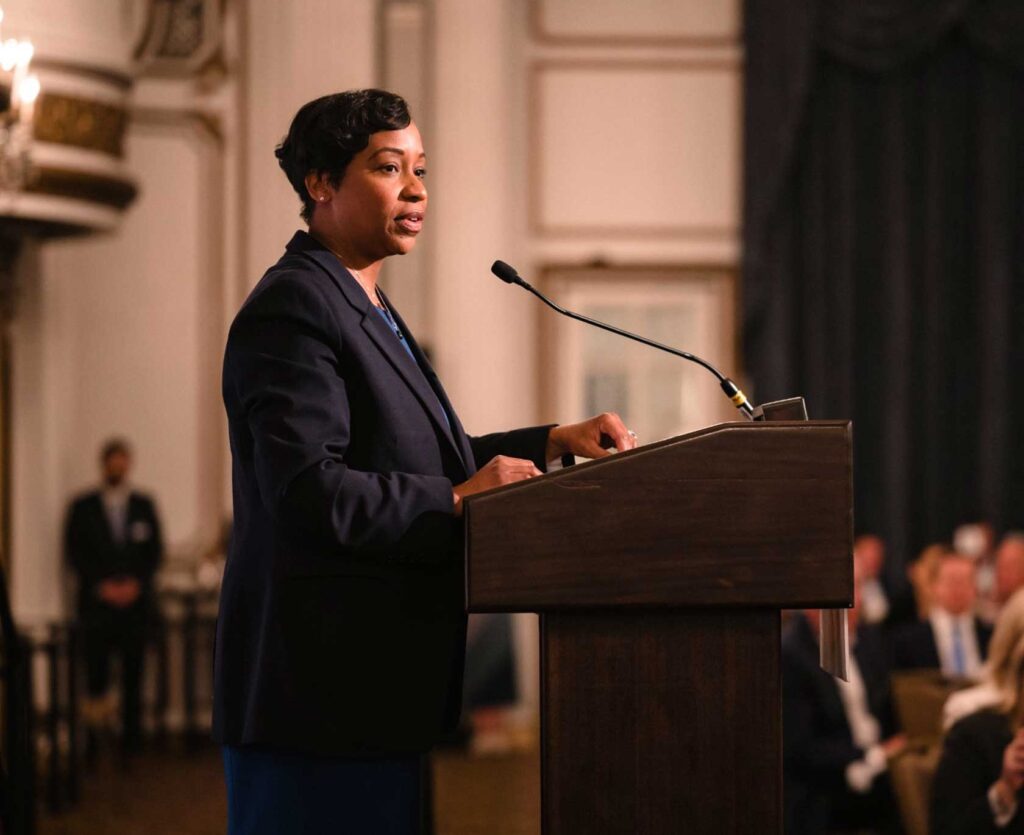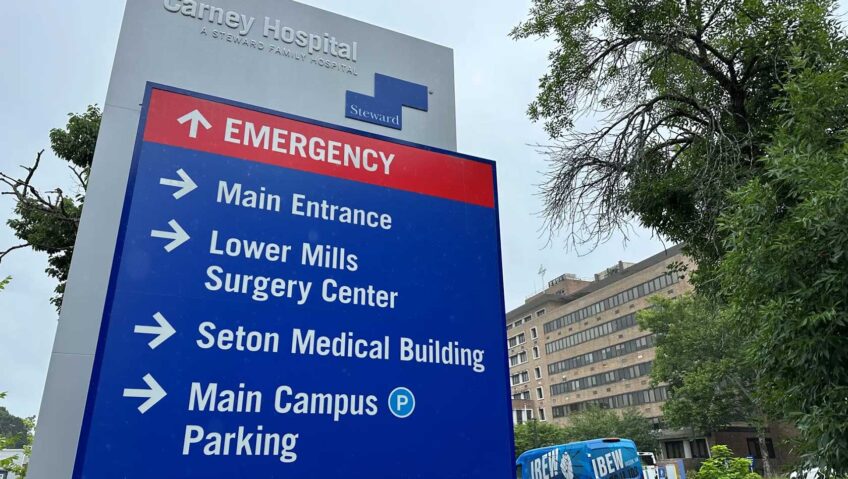Andrea Campbell in her own words
One year on the job, the attorney general answers questions

District Attorney Andrea Campbell made Massachusetts history in 2022 when she became the first woman of color elected to statewide office. Running on a campaign of progressive reforms to state government, Campbell has taken on police reform and accountability, worked to protect women’s rights to reproductive health and worked to combat gun trafficking.
The Mattapan Democrat has also continued her office’s work on the traditional areas of work of the Massachusetts attorney general including consumer protection, civil rights, labor rights and serving as the state’s top attorney. In that latter capacity, last year she successfully defended the state’s law banning assault rifles, filed a lawsuit against the white supremacist group NSC-131 for civil rights violations and launched an investigation into the Boston Police Department’s controversial gang unit and gang database over allegations of racial bias.
Campbell sat down with the Banner last month to discuss her work.
The following interview has been edited for clarity.
You’ve made police reform and accountability one your major areas of work. Why do you feel this issue is important and what’s the role for the attorney general in police reform?
Campbell: I’ve cared about police accountability issues for some time because I think sometimes the narrative is that you can’t have reform at the same time that you support law enforcement. But you can have both. We can make sure that the police are fully resourced while at the same time holding accountable departments or individuals that are misappropriating funds, violating the code of conduct of their respective police departments or abusing their power. We can do both. Our office was given the authority under the recent criminal legal reform act post George Floyd to take on systemic issues in this space and pattern and practice investigations. We have the authority, but what we need [are] the tools, the resources and the team. I’m excited that we are going to be getting the police accountability unit off the ground to exercise on that authority to do it in a more collaborative way and to assign resources and team members to take that on because it’s still a major issue in the Commonwealth where people talk about the disparities in policing that they’re seeing. If they’ve experienced some type of over policing in their community, they reach out to our office.
After the Supreme Court released the Dobbs decision, you came out strongly in support of protecting women’s rights here in Massachusetts. To what extent has your office been able to make a difference for women who are seeking reproductive health?
It’s a critical role that Massachusetts plays. I think before the Dobbs decision, folks should understand, it was our health care providers here in Massachusetts who were going to other states to train folks on providing not only access to abortion, but excellent reproductive health care. It was our state that had the most progressive laws when it came to these issues. And we were setting ourselves up just in case Dobbs came to be prepared for that. So we have the most progressive shield law in the country, protecting providers and patients. Our office is building upon that work. We established the abortion hotline so people understand their rights in this moment in time and have a place to go to that’s confidential. We established the reproductive justice unit not only to support national efforts to maintain access, particularly in other states to reproductive health care, and gender affirming care, but also here in Massachusetts. We are making sure that, where there are gaps in the state for folks to be able to access abortion or reproductive health care, we’re closing those gaps and in certain parts of Western Mass. and Central Mass.
This is bigger than how someone may feel personally about their right to access an abortion, regardless of how you feel about that issue. If the Supreme Court could take away that right that was enshrined as a solid protection for us, they can go after any other civil rights. So everyone should be concerned about the status of the court in taking away rights.
Worker protection has also been a mainstay of the attorney general’s office. You mentioned wage theft particularly in your inaugural address. Why is that issue of particular concern?
What I find is even as we talk about what’s happening with the Supreme Court, gun violence, reproductive justice, the number one issue that most people are talking about is affordability. This idea that folks who go to work one, two or three jobs, do their best to not only show up on time, but to deliver an excellent service to the community and are not paid for those services. And that is just unacceptable. So we have a whole division in the office that prioritizes this work to literally put money back into the pocket of those workers. These cases are continuing even through the holiday season. We’re aggressively going after employers or contractors and others that will not pay their workers to push them to give us restitution, of course that will go to these workers but also to hold them accountable with various penalties for those who continue to do this over a period of time. The other piece that is just as important in giving that money back to workers is focusing on children. There are a lot of violations by employers of child labor laws. We prioritize youth in this conversation. They work, too, and need to be protected.
Your office is also working on gun trafficking.
Gun violence we know is still prevalent in certain parts of the state, including our gateway communities, poor communities, communities of color. We were already, through our State Police Unit and our Criminal Bureau, prosecuting cases where we’re seeing ghost guns, a large number of them on the streets in our communities, contributing to the violence. [We are] taking that on, taking on gun trafficking, and supporting victims and advocates as they go through this process to make sure they have access to the Victim Compensation Fund. Our office plays a critical role in supporting community-based organizations that are breaking cycles of violence through our grant work, and so we established a Gun Violence Prevention Unit to make sure that that work, which is happening in different divisions across the office, is more coordinated, more intersectional. So how do we support law enforcement and be a point of contact for them, so they know how to enforce our gun laws, offer trainings and other ways …[to] support community-based organizations and use our various tools, including our grant making tool to support them.
There is a place for Massachusetts to show up at the national level in protecting the laws in other states that we probably take for granted here. We’re working with California to support their assault weapons ban. We’re working with the feds to expand the definition of what types of firearm sales, for example, should be eligible for background check. So, this unit will work to coordinate that here and also nationally, and it’s significant work. I hope folks will pay attention to it because we want to focus not just on the gun law enforcement piece, and expanding legislative solutions on that, but also the community piece that is often missing from the conversation but plays a critical role in breaking these cycles.
What motivates you to do the work you do?
What I love about my job and working with this incredible team at the office is, given the pressing issues of this moment in time, it really is an office doing the work that will not only have a significant impact on constituents, but it’s the only office that has the tools to be able to respond to these issues. You think about reproductive justice, gun violence, police accountability, affordability issues, scams of our elders, the racial wealth gap — so, so many issues that are pressing. It is this office that has those tools to respond.







